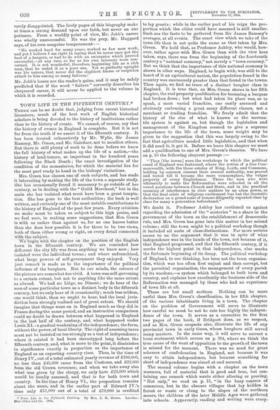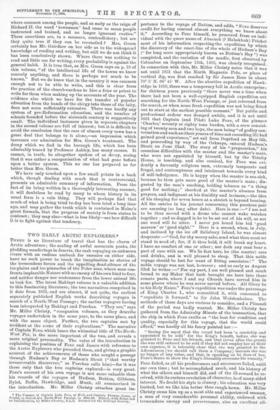TOWN LIFE IN THE FIFTEENTH CENTURY.* THERE can be no
doubt that, judging from recent historical literature, much of the best work of English historical scholars is being devoted to the history of institutions rather than to the history of events. We cannot, of course, say that the history of events in England is complete. But it is not far from the truth if we assert it of the fifteenth century. It has been treated exhaustively by Mr. Wylie, Sir James Ramsay, Mr. Oman, and Mr. Gairduer, not to mention others. But there is still plenty of work to be done before we know the fall history of what makes up the life of a nation,—the history of land-tenure, so important in the hundred years following the Black Death ; the exact investigation of the condition of the monasteries, for which the material lies for the most part ready to hand in the bishops' visitations.
Mrs. Green has chosen one of such subjects, and has made iL interesting by making the life of the town a separate study. She has occasionally found it necessary to go outside of her century, as in dealing with the " Guild Merchant," but in the main she has resisted what must have been a great tempta- tion. She has gone to the best authorities ; the book is well written, and certainly one of the most notable contributions to the history of England of the past few years. Every criticism we make must be taken as subject to this high praise, and we feel sure, in making some suggestions, that Mrs. Green is with us rather than against us, for no one knows better than she does bow possible it is for there to be two views, both of them either wrong or right, on every detail connected with the subject.
We begin with the chapter on the position of the English town in the fifteenth century. We are reminded how different the city life was from anything we know now ; how isolated were the individual towns ; and where enfranchised, what large powers of self-government they enjoyed. Very just remark is made as to the importance of the political influence of the burghers. But to our minds, the colours of the picture are somewhat too vivid. A town was self-governing to a certain extent, but not to anything like the same extent as abroad. We had no Liege, no Dinant ; we do hear of the men of some particular town as a distinct body in the fifteenth century, but we only hear of it occasionally; much less seldom, one would think, than we ought to hear, had the local juris- diction been strongly realised and of great extent. We should imagine that things went on in England much as they did in France during the same period, and an instructive comparison could no doubt be drawn between what happened in England in the last half of the century, and what happened under Louis XI. : a gradual weakening of the independence; the form, without the power, of local liberty. The right of assessing taxes must not be insisted on too strongly as a test of independence ; where it existed it had been stereotyped long before the fifteenth century, and, what is more to the point, it diminishes in significance exactly in proportion as the importance of England as an exporting country rises. Thus, in the time of Henry IV., out of a total estimated yearly revenue of £106,000, no less than £45,000 came from the Customs, and £22,600 from the old Crown revenues ; and when we take away also what was given by the clergy, we only haVe £23,000 which would be locally assessed, and that is for both town and country. In the time of Henry VI., the proportion remains about the same, and in the earlier part of Edward IV.'s time only £11,000 out of a total of £79,000 is credited * Town Life in no Fifteenth Century. By MIA J. R. Green. Lomlon ; Dino r. Ulan nod Co. 1894. to lay grants ; while in the earlier part of his reign the pro- portion which the cities could have assessed is still smaller.
Such are the facts to be gathered from Sir James Ramsay's averages, at all events. The exact view which we take of the town life then is not quite the same as that taken by Mrs. Green. We hold that, as Professor Ashley, who would, how- ever, rather agree with Mrs. Green than with the view here taken, says, there was from the beginning of the fourteenth century a "national economy," not merely a "town economy." But we think that the importance of this national economy is shown in other ways. England, to begin with, was still to the heart of it an agricultural nation, the population found in the country was enormously greater than that found in the towns. Then again, we find no trace of a distinct burgher class in England. It is true that, as Mrs. Green shows in her fifth chapter, the real property qualification for becoming a burgess had broken down ; but what had taken its place was, so to speak, a most varied franchise, one easily assumed and obviously embracing a great many different classes, not a merchant or trading franchise. We freely admit that the history of the rise of what is known as the mercan- tile system is against us, but though the legislation and management of the Kingdom seemed to give a supreme importance to the life of the town, some weight may be given to the suggestion that this was largely owing to the fact that agriculture needed little legislation, and that when it did need it, it got it. Before we leave this chapter we must add a qualification to one of Mrs. Green's theories. We have on p. 10 the following eloquent passage :—
"They [the towns] were the workshops in which the political creed of England was fashioned, where the notion of a free Com- monwealth, with the three estates of King, Lords, and Commons, holding by common consent their several authority, was proved and tested till it became the mere commonplace, the vulgar property of every Englishman. There the men who were ultimately to make the Reformation were schooled in all the vexed questions between Church and State, and in the practical meaning of interference in civic matters by an alien power, so that the final crisis of religious excitement was but the dramatic declaration on a grand scale of lessons diligently repeated class by class for many a generation beforehand."
We doubt it. Professor Ashley has cautioned us against regarding the admission of the " misteries " to a share in the government of the town as the establishment of democratic rule, and Mrs. Green has gone into this matter in her second volume; still the town might be a political workshop though it included all sorts of class-distinctions. Far more serious seems to us the argument that it was in spite of what independence was in the hands of the town, not because of it, that England progressed, and that the fifteenth century, if it marks the highest point in that independence, also marks the fortunate beginning of its decay. The political workshop of England, to our thinking, has been not the town organisa- tion, which was too often first unjust and then corrupt, but the parochial organisation, the management of every parish by its wardens,—a system which belonged to both town and country, and explains how excellently the business side of the Reformation was managed by those who had no experience of town life at all.
These are but small matters. Nothing can be more useful than Mrs. Green's classification, in her fifth chapter, of the various inhabitants living in a town. The chapter on the problem of Government will serve to illustrate how careful we must be not to rate too highly the indepen- dence of the town. It serves as a corrective to the first two pages of the book, if Bridport does, as we suspect, and as Mrs. Green suspects also, illustrate the life of any provincial town in early times, whose burghers still served many masters. In the same way, it will serve to correct a loose statement which occurs on p. 384, where we think the true cause of the want of opposition to the growth of the town is missed for the moment. There was no need for great schemes of confederation in England, not because it was easy to attain independence, but because something far short of independence was aimed at and secured.
The second volume begins with a chapter on the town manners, full of material that is good and true, but con-
taining one remark which wants either altering or proving. "Not only," we read on p. lö, "in the busy centres of commerce, but in the obscure villages that lay hidden in
forest or waste or clung to the slopes of the northern moors, the children of the later Middle Ages were gathered into schools. Apparently, reading and writing were every. where common among the people, and as early as the reign of Richard II. the word 'townsmen' had come to mean people instructed and trained, and no longer ignorant rustics." These assertions are, in a measure, contradictory ; but are they quite true if they can be reconciled P Mrs. Green certainly has Mr. Gairdner on her side as to the widespread knowledge of reading and writing, but still we do not think it has been conclusively shown. Where there was nothing to read and little use for writing, every probability is against the general habit. It is true that, as Mrs. Green says on p. 19 of this volume, "of the intellectual life of the towns we know scarcely anything, and there is perhaps not much to be known." But we do know that in the country it was common enough not to be able to write, and this is clear from the practice of the churchwardens to hire a friar or priest to write for them when making up the accounts of the year. The evidence also which we have for the transfer of popular education from the hands of the clergy into those of the laity, does not seem sufficiently extensive. There was hardly any system of pre-Reformation education, and the number of schools founded before the sixteenth century is suggestively small. The individual instances given in separate chapters in the second volume are full of interest; but it is difficult to avoid the conclusion that the case of almost every town has a great deal that belongs to it alone,—an impression which increases our admiration for Mrs. Green's treatment. The decay which we find in the borough life, which has been admirably traced by Professor Ashley, has many causes. It cannot, in truth, be altogether spoken of as decay, seeing that it was rather a reorganisation of what had gone before upon a better system. This no one has prepared us for better than Mrs. Green.
We have only touched upon a few small points in a book which, though dealing with much that is controversial, presents an admirable summary of information. From the fact of its being written in a thoroughly interesting manner, it will doubtless be read by many to whom history in its usual form is a vain thing. They will perhaps find that
much of what is being tried to-day has been tried a long time ago, and may gather the truth which is contained in Maine's great formula, that the progress of society is from status to contract ; they may also—what is less likely—see how difficult it is to fight against that tendency.



















































 Previous page
Previous page